We made it, baby. This is the last Tabs Open of the year. I was aiming to get this list in before you all got fatigued by the preponderance of them you’re likely awash with, but alas.
The end of the year is always a fitting occasion to look back on what helped you get through it, and this has perhaps never been truer than in these uncertain times. The list below is by no means comprehensive and will leave out plenty of things that did help me survive 2021, in large part because there’s no helpful link for “friends” or “family” or “dog” or “hummingbirds” I can post below.
Anyway, enough preamble. Here is a smattering of things that helped make my 2021 what it was. Maybe they’ll help make your 2022 what it’s going to be.
Newsletters
I hate getting emails, except from a select few sources of my choosing. I love getting newsletters from my friends, whose talents and insights regularly astonish me. It’s cronyism time—check out the list below!
the immense wave: This newsletter is ostensibly about music, but it’s not some kind of Pitchfork-y review blog full of inscrutably abstract language. Instead, it uses the songs that are its subjects as jumping-off points to uncover much deeper truths about feeling and memory and the human condition. It hits me right in the heart, every single week.
Can’t-miss issue: I wanna cut to the feeling
four things: The world puts a lot of pressure on people who make stuff to make it quickly, cheerily, and perfectly. The four things newsletter is refreshing in its commitment to documenting the process of making art (and making vegan food), which is often messier, less intentional, and more frustrating than any of us would like to pretend.
Can’t-miss issue: 023 tuesday june 29th
The Action Cookbook Newsletter: For paid subscribers like me, this comes three times a week, which is staggeringly impressive given that its author, my friend Scott, also has a day job and kids. The Monday and Wednesday offerings cover everything from architecture to parenting to short fiction, but the Friday edition—a 7-item list that always includes a recipe and a cocktail of the author’s own invention—is the heart and soul of the ACBN.
Can’t-miss issue: Talk about compassion
Carrot Quinn: Carrot is the author of two good books, Thru-Hiking Will Break Your Heart (which helped inspire my own PCT journey) and the recently released The Sunset Route (see below). She also keeps a newsletter, where she chronicles the highs, lows, mysteries, and revelations of all her hikes. I have rarely encountered someone with such a capacity to suffer and endure, and she pours it out onto the page with a real gift for imagery and self-reflection.
Can’t-miss issue: ponderosa immersion therapy
Ordinary Plots: Devin Kelly writes about poetry in a way that frankly fills me with envy. The depth and sensitivity of his observations—about that week’s poem, yes, but also the world—are staggering, and has made me rethink so much about my own life and my place in the world.
Can’t-miss issue: W.S. Merwin’s ‘The Morning’
Music
Billy Strings, Renewal: I feel the same way about William Apostol’s stage name as I do about the moniker of the group that called themselves The Band: if you’re going to go by that, you’d better earn it. There is little doubt that Billy Strings has. Renewal, his fifth studio album, has plenty of burn-the-barn-down bluegrass tunes, but interspersed with them are serious ruminations on addiction, loss, love, and (you guessed it) death. Even if his lyrics weren’t deeply moving—they are—he’d be worth listening to on the strength of his prodigious guitar-playing talent alone.
Must listen: “In The Morning Light”
Sturgill Simpson, The Ballad of Dood & Juanita: It doesn’t rank high on the list of problems we’ve faced in the past two years, but the COVID era has taken three separate Sturgill Simpson concerts from me — I had tickets to see him in George, Washington and in Brooklyn two weeks apart in 2020, shows which were cancelled for obvious reasons; I also had tickets to see him play the Ryman Theater in Nashville last month, which was cancelled when Simpson tore a hole in his vocal chords. Until some future day when I can see him play live again, I’m making do with Dood & Juanita, Simpson’s fictionalized tale of his grandparents’ young love. It’s an “Eastern” (not a Western), a tale of romance and greed and vengeance and redemption packed into a tight 27 minutes. There’s a song recommendation below, but really I never listen to any of the album without listening to the whole thing. It feels sacrilegious not to give every song its proper context.
Must listen: “Played Out”
Sierra Ferrell, Long Time Coming: I’d been eagerly anticipating the release of Sierra Ferrell’s first full-length album since the first time I watched her play on the Western AF YouTube channel. It didn’t disappoint, although several of my favorite songs of hers, including the coal miner battle cry “29,” didn’t make the cut. The album weaves together traditional bluegrass and Americana sensibilities with a sort of jazzy Calypso lounge singer vibe for a sound that’s really unique and fun.
Must listen: “West Virginia Waltz”
Margo Cilker, Pohorylle: This album just came out in November, but since a buddy first put me onto it a few weeks ago, I’ve been playing it non-stop. Cilker has called her music “not country-western, just western” and that’s certainly a fitting moniker for it, and not just because she name-drops spots all through Washington, Oregon, and California. Cilker’s music is simple, plaintive, and hauntingly beautiful, and rich with place, bringing you right into whatever wide open landscape or dimly-lit bar she describes. The kind of writing that seems both effortless and aspirational, basically.
Must listen: “Wine in the World”
Books
Infinite Jest, by David Foster Wallace (1996): This book has become shorthand for “the literary tastes of (ugh) mediocre white men,” but as a member of the community, I am proud to tell you that I do not care. Are there parts of it that have aged like a fine milk? Absolutely. But it is also one of the most cleverly, intricately crafted1 novels ever written, and its meditations on technology, drugs, isolation, and failure feel like they were made for the lives we’ve all lived these past two years. It is in turns silly, political, and deeply moving, which I really appreciate. Plus it takes some real digging and dot-connecting to figure out what has actually happened by the end of the book, some of the most important of which happens completely between the lines or off the page. (Spoilers in that link.)
Line that sticks with me: “You will become way less concerned with what other people think of you when you realize how seldom they do.”
The Books of Earthsea, by Ursula K. Le Guin (spanning 1968 - 2001): After listening to the first book in this series, A Wizard of Earthsea, during a long road trip at the end of last year, I came home and devoured the rest of them in about a month. This is unlike any other fantasy series I’ve ever read. Despite centering mostly on the life of an adventuring wizard named Ged, the magic is subtle and the violence muted, being far less important to Le Guin’s narrative than the larger questions of life, love, death, and duty. I was glad that I had bought them all at once in the single complete illustrated volume, because in between each story is also a reflection from Le Guin where she talks about her process, and the way her thinking and her politics changed over the course of 30+ years writing this series.
Line that sticks with me: “You will die. You will not live forever. Nor will any man nor any thing. Nothing is immortal. But only to us is it given to know that we must die. And that is a great gift: the gift of selfhood. For we have only what we know we must lose, what we are willing to lose... That selfhood which is our torment, and our treasure, and our humanity, does not endure.”
The Essential Poems, by Jim Harrison (2019): I have been chipping away at this collection since it first came out, the same way I do with every book of poetry I read: I bounce around at random and wait to find myself moved. It happens more regularly with this Harrison collection than just about any other I own. Spanning more than 50 years of the life of “The Lion of American Letters,” The Essential Poems is teeming with life and lust, made all the more authentic by Harrison’s refusal to ever look away from the death he had first sensed close by in childhood.
Line that sticks with me:
The Sunset Route, by Carrot Quinn (2021): I sung Carrot’s praises earlier, so I’ll just tell you that this book, the story of her childhood spent in poverty in Anchorage and her young adulthood spent hopping trains back and forth across the country, is deeply moving and so captivating that you’ll probably finish it in a few sittings. Powerful, heartbreaking stuff.
Line that sticks with me: “What was flaking paint, despair, secondhand smoke? What was hunger? It was nothing in the face of the forests and the tide, the flowers in the springtime, the howling of wolves in the high mountains, the glittering white snowbanks in the dark of winter.”
The Overstory, by Richard Powers (2018): I’ll be honest — despite never having heard anything but praise for this intricately layered series of stories, I was ready to give up on it in the first 100 pages. I didn’t feel like it had earned the tragedies or tropes that featured so prominently in the early going. All that changed when I hit the story of Patricia Highsmith, “Plant Patty,” who gives the book most of its soul. In a very short space of pages I went from being disappointed to enraptured, maybe even transformed, by this book.
Line that sticks with me: “To be human is to confuse a satisfying story with a meaningful one, and to mistake life for something huge with two legs.”
Laziness Does Not Exist, by Devon Price (2021): I have been internet friends with Devon for years, so I was beyond excited for this debut book, a cutting and thoughtful meditation on what it means to be a human living and working here in 2021. This is an anticapitalist manifesto posing as a self-help book, one that I think has the power to make a lot of people rethink the toxic relationship they have with work. (I’m also attached to this book because I got to review it for Jacobin, and my review is now blurbed on the back cover of the paperback edition.)
Line that sticks with me: “…burnout is not just a labor issue, it’s a public health issue. Overwork strips many of us of our health, our cognitive capacity, and even our passion for life.”
Food
My 2021 was one marked by a lot of experimentation in the kitchen. Much of it was driven by my desire to incorporate fresh and interesting things that I could find locally—sometimes even in my own neighborhood, as you’ll see below.
Foraged Stuff: If you follow me anywhere else online, you’ve probably seen my immersion into amateur foraging. I stay away from mushrooms, which scare the hell out of me, but I have found so many new things to try—like fuchsia, ginkgo, arbutus, magnolia flowers, and more—just by walking around the parks near my apartment with ideas I’ve gleaned from people who do this kind of thing more professionally. I’ve made cookies, jelly, simple syrup, tea, pie, and more with things I’ve plucked from trees and off the ground, thanks in large part to the people listed below.
Favorite sources: @blackforager, Grow Forage Cook Ferment, Must Love Herbs, r/foraging
Pie: Okay, this has basically made my year every year for the last couple. But I’m getting better and better at it, and consequently more ambitious. Maybe half the time I just make up fillings that I think would taste good, but when I feel like getting ideas from a real recipe, I have a few key go-tos.
Favorite sources: Pieometry (Lauren Ko), Sister Pie
Soup: Love a good soup. Who doesn’t? I think I only made two different soups all year, but I think that’s a fine number if one’s soups are hearty and reliable. I put my own spin on each recipe—incorporating sage and goat cheese into the tomato soup, making the watercress soup & lemon cream vegan—but really, it’s hard to go wrong here.
Favorite sources: 3-Ingredient Tomato Soup, Watercress Soup with Lemon Cream (from The Forager Chef’s Book of Flora)
This was my 4th time reading IJ, and I have gotten more and more out of it each time. (The first time I read it I didn’t even realize there were several hundred pages of endnotes you’re supposed to read as you go that tell some of the most important parts of the story.) If you were thinking about being impressed by that, let me tell you that the first 3 times were all during my year living in the Marshall Islands when I was 21-22, and had so little to do that I managed to triple up on both IJ and the Lord of the Rings trilogy and still make time for 60+ other novels.

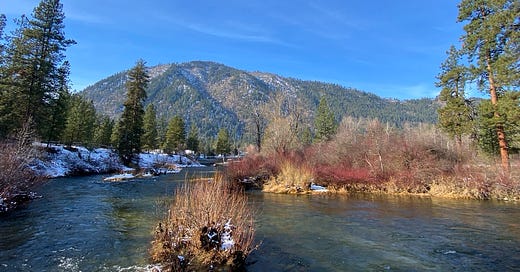



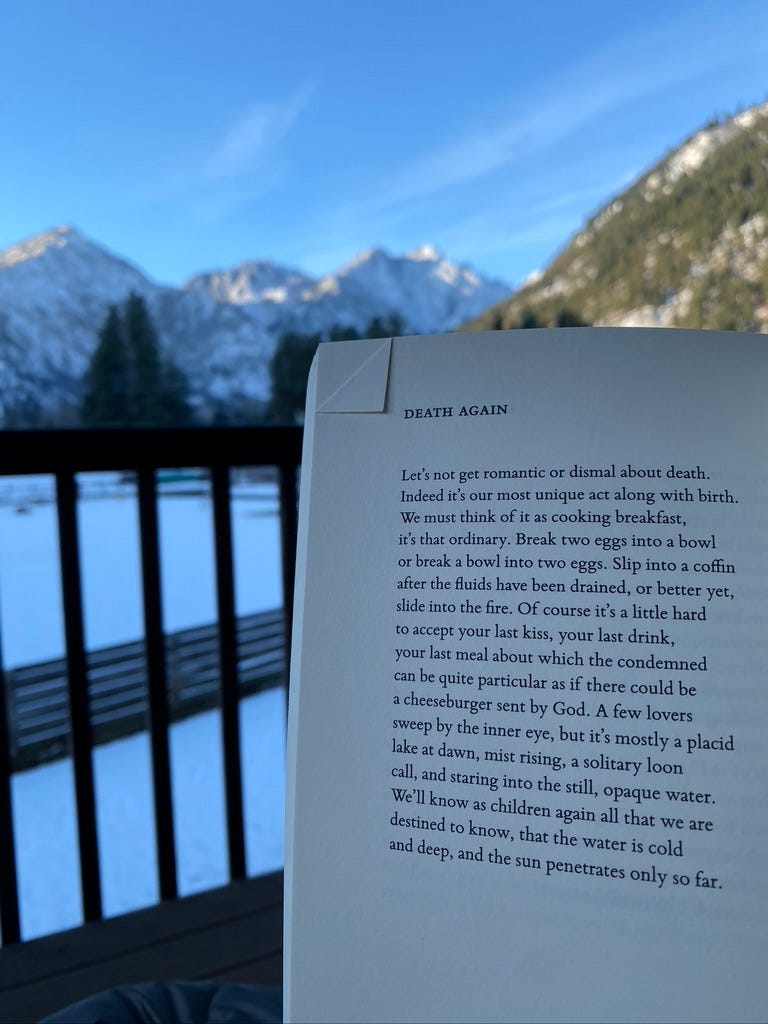
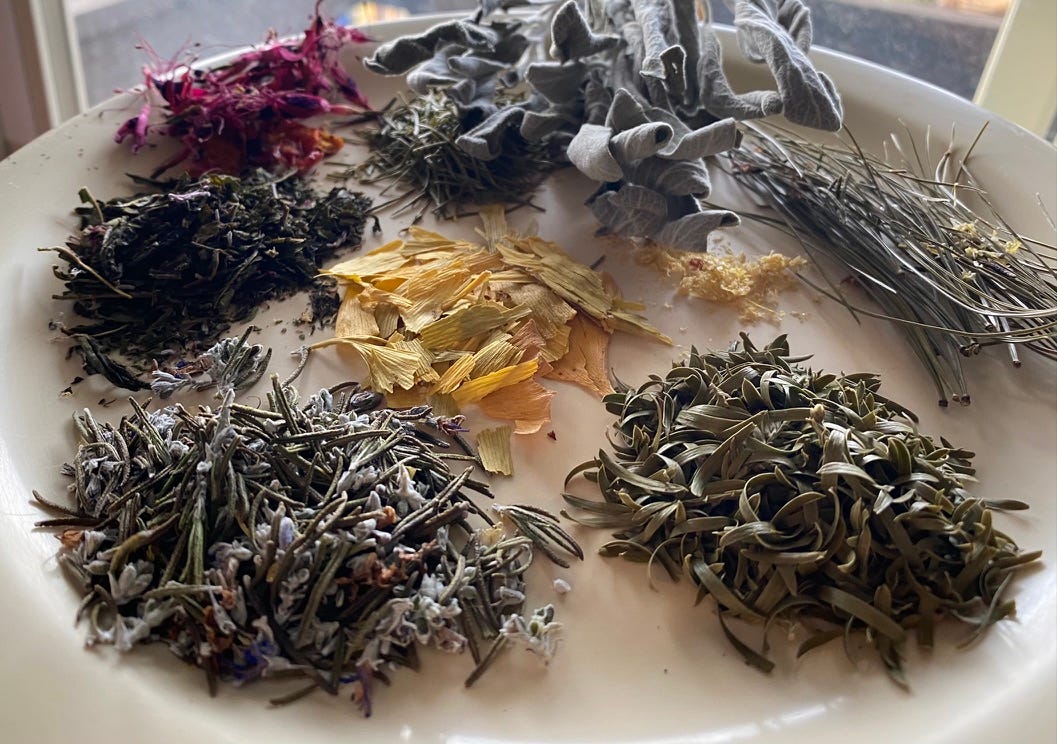
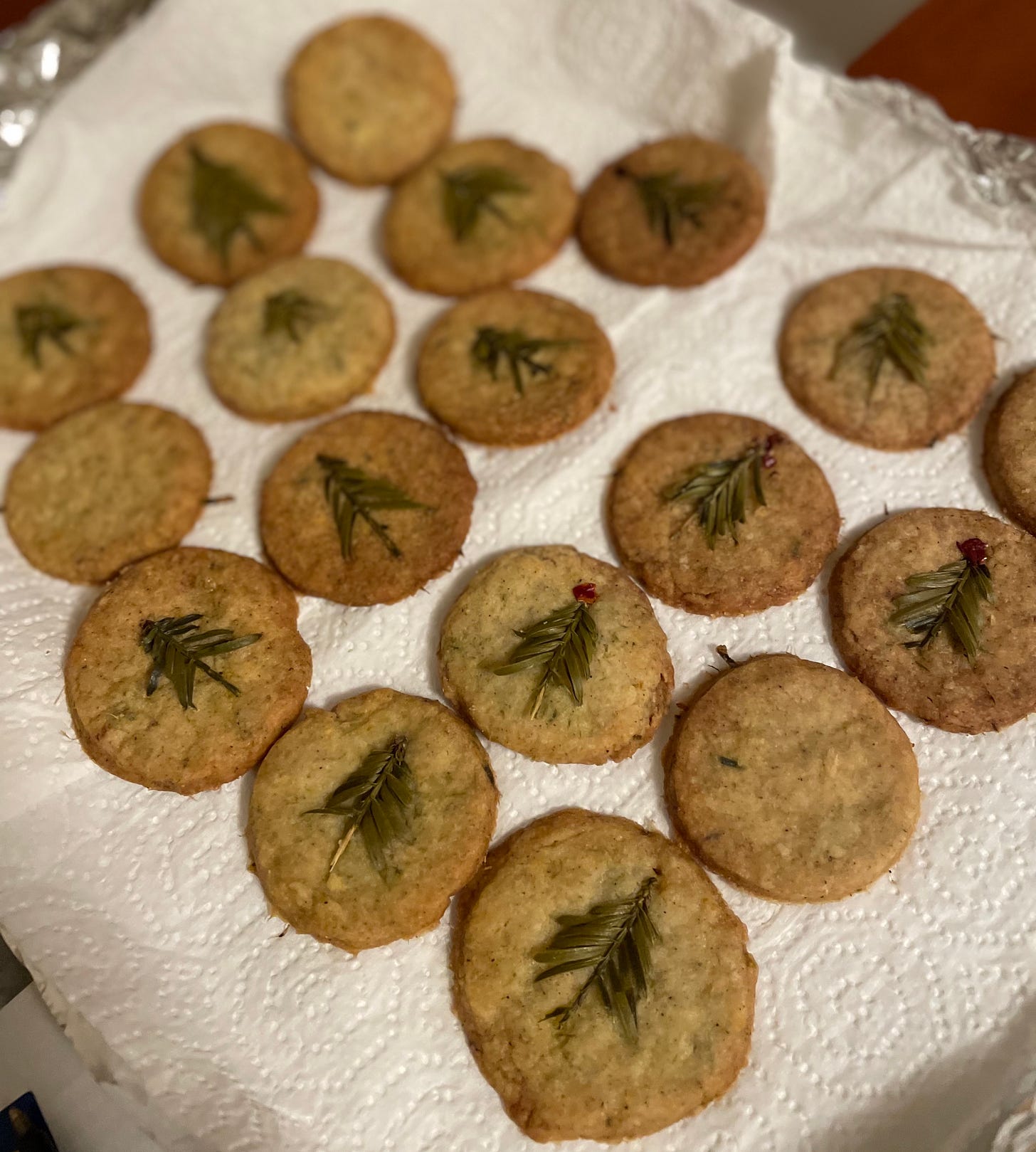
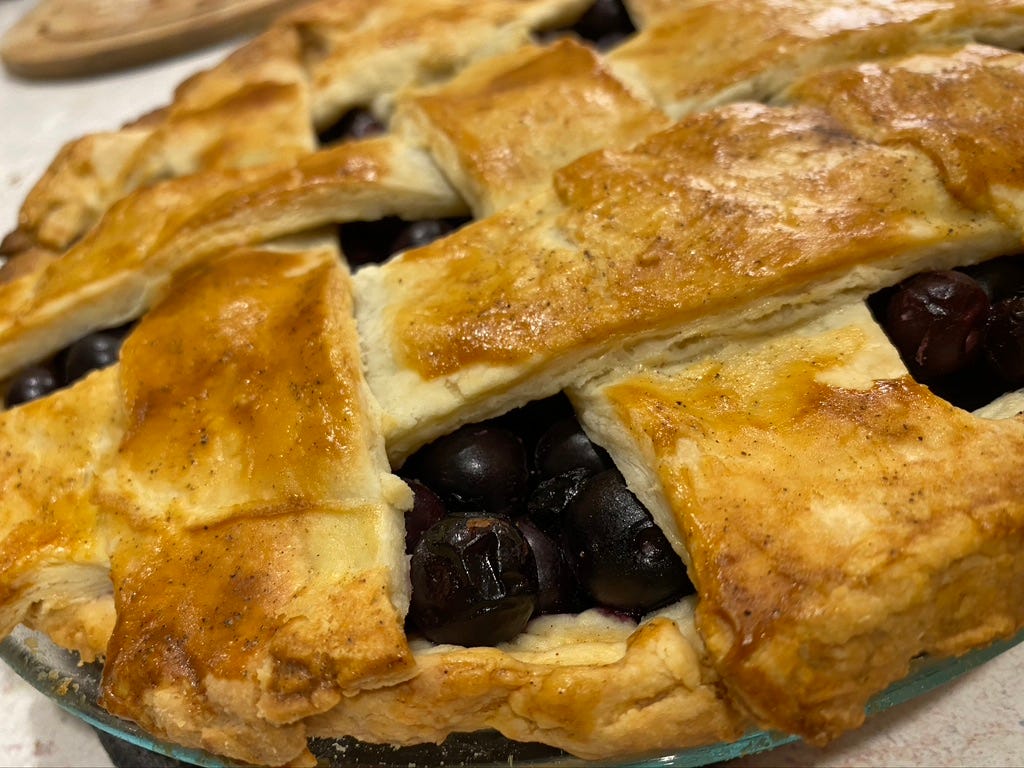
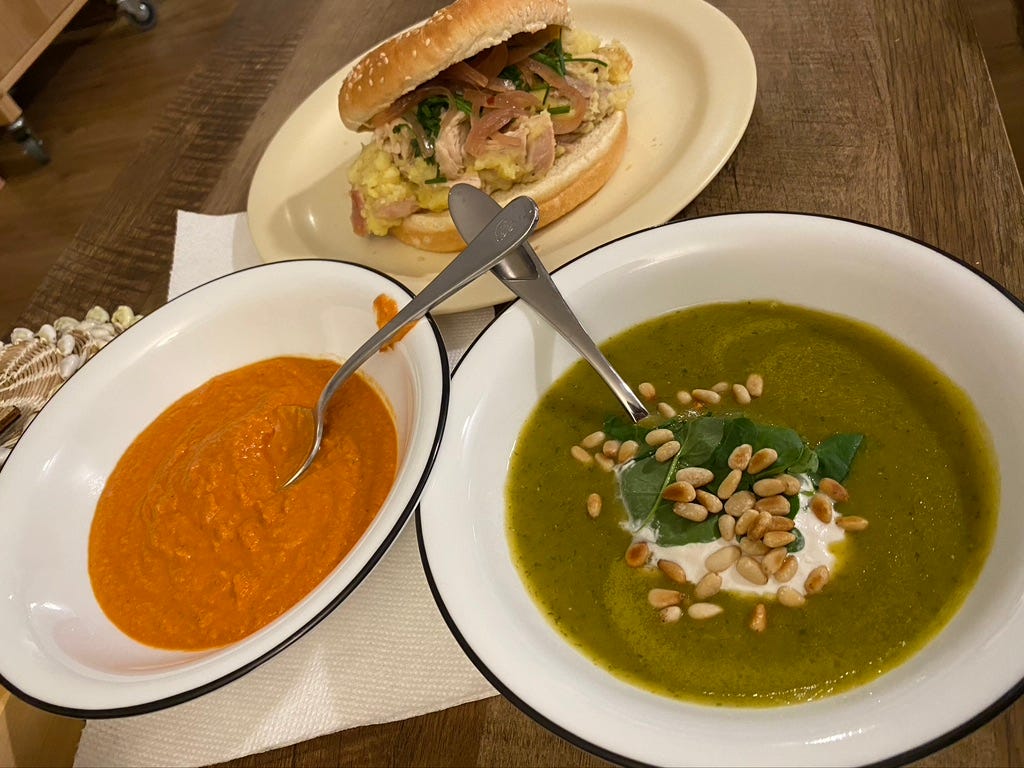
Thanks for sharing this buddy!
I have been a regular reader this year after actioncookbook recommended this and I can honestly say that your newsletter has been one of my favorite new things in 2022. Happy New Year!